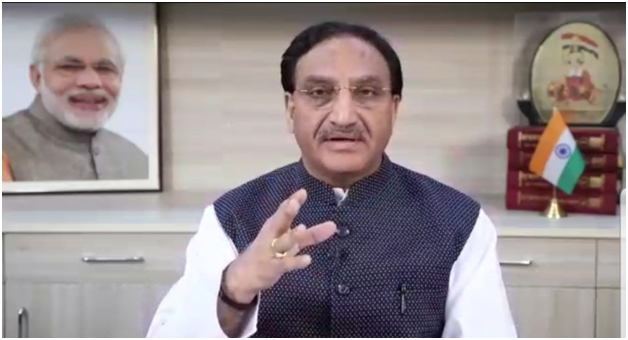NE NEWS SERVICE
NEW DELHI, JULY 29
The New Education Policy approved by the Union Cabinet on Wednesday is a long due and much awaited reform in the education sector which will transform millions of lives in the times to come, Prime Minister Narendra Modi said.
I wholeheartedly welcome the approval of the National Education Policy 2020! This was a long due and much awaited reform in the education sector, which will transform millions of lives in the times to come! #NewEducationPolicyhttps://t.co/N3PXpeuesG
— Narendra Modi (@narendramodi) July 29, 2020
He also said in the era of knowledge where learning, research, and innovation are important, the new policy will transform India into a vibrant knowledge hub.
In a series of tweets, he said the New Education Policy is based on the pillars of “access, equity, quality, affordability, and accountability”.
“I wholeheartedly welcome the approval of the National Education Policy 2020. This was a long due and much-awaited reform in the education sector, which will transform millions of lives in the times to come … May education brighten our nation and lead it to prosperity,” he said.
#NEP2020
The medium of instruction (preferably) till Grade 8 & beyond, will be the home language/mother-tongue/local language/regional language.
Starting from the Foundational Stage, children will be exposed to different languages with a particular emphasis on the mother tongue. pic.twitter.com/w5hM3riTpF— Ministry of Education (@EduMinOfIndia) July 29, 2020
A single regulator for higher education institutions, multiple entries and exit options in degree courses, discontinuation of MPhil programmes, low stakes board exams, common entrance exams for universities are among the highlights of the new National Education Policy approved by the Union Cabinet on Wednesday.
Referring to the consultation process before the policy was brought before the Union Cabinet, the prime minister said the framing of NEP 2020 will be remembered as a shining example of participative governance.
#NEP2020
Ensuring universal access to high-quality Early Childhood Care and #Education across the country.#ECCE will focus on developing social capacities, sensitivity, good behaviour, courtesy, ethics, personal & public cleanliness, teamwork & cooperation among children. pic.twitter.com/qQ3JVoqHW8— Ministry of Education (@EduMinOfIndia) July 29, 2020
“I thank all those who have worked hard in the formulation of the NEP 2020,” he said.
Aspects such as widening the availability of scholarships, strengthening infrastructure for open and distance learning, online education, and increasing the usage of technology have received great attention in the NEP. These are vital reforms for the education sector, he asserted.
“Respecting the spirit (of) ”Ek Bharat Shreshtha Bharat”, the NEP 2020 includes systems to promote Indian languages, including Sanskrit,” he said.
The ”Ek Bharat Shreshtha Bharat” initiative of the central government seeks to promote the spirit of national integration through a deep and structured engagement between all states and union territories through planned engagement.
“Many foreign languages will also be offered at the secondary level. Indian Sign Language (ISL) will be standardised across the country,” the prime minister added.
Cabinet Briefing @PrakashJavdekar @DrRPNishank https://t.co/47u5S0pH6f
— Dr. Ramesh Pokhriyal Nishank ( Modi Ka Parivar) (@DrRPNishank) July 29, 2020
Ministry of Human Resource Development (MHRD) is back to being Ministry of Education
The Ministry of Human Resource Development (MHRD) is back to being Ministry of Education with the Union Cabinet approving the change in its name on Wednesday.
The name change was among the key recommendations of the draft New Education Policy, which was also cleared in Wednesday’s Cabinet meeting.
The Ministry of Education was renamed as the HRD ministry in 1985, during the tenure of former Prime Minister Rajiv Gandhi. The next year the National Education Policy (NEP) was introduced which was later amended in 1992.
PV Narasimha Rao became the first HRD minister in the Rajiv Gandhi Cabinet.
A panel headed by former ISRO Chairman K Kasturirangan, tasked with working on the new NEP, had first proposed that the name of the ministry should be changed again.
In 2018, the idea was also mooted by Ram Bahadur Rai, chairman of the Indira Gandhi National Centre for the Arts and also chairman of the joint organising committee of the Conference on Academic Leadership on Education for Resurgence.
At a conference organsied by RSS affiliate Bharatiya Shikshan Mandal, Rao had suggesting that former PM Rajiv Gandhi had changed the name of the education ministry to HRD ministry in September 1985 under the advice of some “people who may have misled him”, and opined that “treating education or humans as a resource is against Indian values that look at education more holistically”.
New education policy was part of the Bharatiya Janata Party’s manifesto ahead of the 2014 general election.
The K Kasturirangan panel had submitted the draft of the new NEP to Union Human Resource Development Minister Ramesh Pokhriyal ”Nishank” when he took charge last year.
The drafting experts also took into account the report of a panel headed by former cabinet secretary T S R Subramanian and formed by the HRD Ministry when it was headed by Union Minister Smriti Irani.









